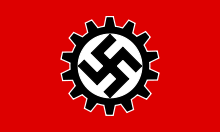- German Labour Front
-
The German Labour Front (German: Deutsche Arbeitsfront, DAF) was the National Socialist trade union organisation which replaced the various trade unions of the Weimar Republic after Adolf Hitler's rise to power.
Its leader was Robert Ley, who stated its aim as 'to create a true social and productive community' (Smelster, 1988). Theoretically, the DAF existed to act as a medium through which workers and owners could mutually represent their interests. Wages were set by the 12 DAF trustees. The employees were given relatively high set wages, security of work, dismissal was increasingly made difficult, social security programmes were started by the Arbeitsfront, leisure programmes were started, canteens, pauses and regular working times were established, and therefore generally the German workers were satisfied by what the DAF gave them in repaying for their absolute loyalty.
Employment contracts created under the Weimar Republic were abolished and renewed under new circumstances in the DAF. Employers could demand more of their workers, while at the same time workers were given increased security of work and increasingly enrolled into social security programmes for workers. The organisation, by its own definition, combated capitalism, liberalism, but also revolution against the factory owners and the national socialist state. The DAF however did openly prefer to have large companies nationalised by the German state, instead of privately owned companies.
DAF membership was theoretically voluntary, but any workers in any area of German commerce or industry would have found it hard to get a job without being a member. Membership required a fee within the range of 15 pfennig to 3 Reichsmark, depending on the category a member fell into in a large scale of 20 membership groups. A substantially large amount of income was raised through fees. In 1934, the total intake was 300,000,000 Reichsmark.
There were 2 main components of the DAF:
- Nationalsozialistische Betriebszellenorganisation (NSBO; National Socialist Factory Organization)
- Nationalsozialistische Handels und Gewerbeorganization (NSHABO; National Socialist Trade and Industry Organization)
Several other sub-organisations were set up:
- Kraft durch Freude (KdF; Strength through Joy) – Organisation giving the workers cheap/free holidays in addition to subsidised sporting and leisure facilities.
- Schönheit der Arbeit (SdA; Beauty of Work) – Aimed to make workplaces more enticing to workers (e.g. renovations of outdated factories, new canteens for workers, smoking-free rooms, cleaner working spaces etc.).
- Reichsarbeitsdienst (RAD; Reich Labour Service) – Solution to the unemployment crisis the Nazis inherited. Provided cheap labour for big state projects, such as the Autobahns. Made compulsory for unemployed men 16-25 in 1935. Provided work security to many unemployed.
The Front also organised the Reichsberufswettkampf, a national vocational competition.
References
- McDonough, Frank (1999); Hitler and Nazi Germany (Cambridge Perspectives in History). Cambridge : Cambridge University Press ISBN 0-521-59502-9
- Smelser, Ronald M. (1988); Robert Ley, Hitler's Labour Front Leader. Oxford : Berg Publishers ISBN 0-85496-161-5
External links
- DAF @ feldgrau.com
- DAF information for AS Level History Unit 3
- Information on the RAD
- Deutsche Arbeitsfront (DAF) at Lebendiges Museum Online. In German.
Categories:- National trade union centers of Germany
- Nazi Germany
- Trade unions in Germany
- Labor history
- Nazi organizations
- National federations of trade unions
Wikimedia Foundation. 2010.

